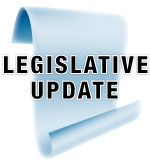 The N.J. General Assembly approved four education bills on Thursday, including one that would call for a study of full-day kindergarten, and whether it would be feasible in New Jersey schools.
The N.J. General Assembly approved four education bills on Thursday, including one that would call for a study of full-day kindergarten, and whether it would be feasible in New Jersey schools.
A-1016 establishes a 22-member task force to study issues related to the establishment of full-day kindergarten. If signed into law, NJSBA would be one of the organizations able to recommend a member to the task force. The task force will study and consider issues including, but not limited to:
- Review of existing research, studies, and data concerning full-day kindergarten, including studies that examine the long-term academic impact and the social and emotional impact of full-day kindergarten;
- Implementation issues associated with full-day kindergarten, including but not limited to, staffing needs, facility space, and class size;
- Funding needed for full-day kindergarten, including sources of funding;
- Curriculum comparisons between full-day kindergarten and half-day kindergarten;
- Opinions and recommendations of parents and elementary school teachers regarding full-day kindergarten; and
- The feasibility of offering full-day kindergarten in school districts statewide.
The task force is required to issue a final report to the Governor and the Legislature within one year of its organization, which contains the task force’s findings and recommendations regarding the establishment of full-day kindergarten.
NJSBA supports the legislation, which reflects a recommendation in its 2013 study, “Special Education: A Service Not a Place.” The bill passed the Assembly by a vote of 63-8 with 4 abstentions. The Senate will next consider the bill.
A-2566 directs the Commissioner of Education to develop and establish an initiative to support and encourage the use of a Response to Intervention (RTI) framework by school districts to promote the achievement of all students. The bill requires the commissioner to ensure that an RTI framework developed and implemented by a school district includes, at a minimum, certain elements that are commonly recognized as core components of any RTI model. These elements include: (1) high quality research-based instruction in the general education setting; (2) universal screening procedures to identify students at risk for poor learning outcomes or behavioral challenges; (3) multiple levels of evidence-based interventions that are progressively more intense, based on the student’s responsiveness; and (4) continuous monitoring of student progress. Finally, the bill requires the commissioner to make technical assistance and training available to assist school districts in implementing an RTI framework. NJSBA supports the legislation. The bill was approved by the Assembly unanimously. The bill now heads to the Senate for its consideration.
A-2502 prohibits the State Board of Education from limiting the number of professional education credits earned at a two-year college that may be applied towards meeting the requirements for teacher certification, provided that the credits are accepted by a state-approved college teacher preparation program. Current State board regulations provide that, for most candidates for teacher certification, no more than six credits earned in the field of professional education at a two-year college can be applied towards meeting the requirements for teacher certification. As a result, a student who has completed more than six credits in the field of professional education at a two-year college prior to his enrollment in a bachelor’s degree program at a four-year institution of higher education will have to repeat some of his coursework. The bill was approved by the Assembly unanimously. The bill now heads to the Senate for its consideration. NJSBA will be monitoring this bill as it moves through the legislative process.
A-1256 would require State Board of Education regulations regarding school nurse certification to include certain minimum eligibility requirements. In June 2013, the State Board adopted amendments to the school nurse certification requirements, which reduced credit requirements for a school nurse endorsement from 30 to 21 semester-hour credits, and reduced credit requirements for a non-instructional school nurse endorsement from 21 to 15 semester-hour credits. The code amendments also eliminated the requirement that a candidate for a school nurse endorsement complete a minimum of six credits in a college-supervised school nurse practicum, half of which is completed in a school nurse office and the balance of which is completed in a classroom. These changes stemmed from a recommendation of the Education Transformation Task Force. The intent of these changes was to simplify certification requirements, address the mismatch between the supply and demand of nurses, maintain health and safety, and increase flexibility for school districts. Initially the task force proposed reducing the required credits from 30 to 12 (instructional) and from 21 to 9 (non-instructional). The State Board eventually struck a middle ground and settled on 21 and 15, respectively.
This bill codifies into law the previous regulations that required a candidate for a school nurse endorsement to complete a minimum of 30 semester-hour credits that include study in subject areas determined by the State board and clinical experience in a school nurse office, in addition to holding a license as a registered nurse and a bachelor’s degree. The bill also codifies the previous requirement that a candidate for a school nurse endorsement must complete a practicum experience in a school nurse office and a classroom. With regard to non-instructional school nurses, the bill codifies the previous State board requirement that they complete a minimum of 21 semester-hour credits as well as a clinical experience.
The bill passed the Assembly 56-16 with 2 abstentions. The bill now heads to the Senate for its consideration. NJSBA will be closely monitoring this bill as it moves through the legislative process.